York University POLS 2900A: Hobbes and Rousseau's Political Authority
VerifiedAdded on 2023/01/06
|7
|1975
|64
Essay
AI Summary
This essay critically analyzes the contrasting political philosophies of Thomas Hobbes and Jean-Jacques Rousseau, focusing on their differing perspectives on the nature of political authority. The paper explores Hobbes's view of the sovereign as 'absolute' and his justification based on a pessimistic view of human nature and the need for order, contrasting this with Rousseau's portrayal of a 'democratic theorist,' emphasizing the general will and the protection of individual rights. The essay delves into the concept of the state of nature, the social contract, and the source of legitimate authority as understood by each philosopher. It highlights Hobbes's emphasis on the ruler's absolute power to control the chaotic state of nature versus Rousseau's belief in popular sovereignty and the importance of the common good, ultimately demonstrating how their differing views on human nature shaped their distinct theories of governance and the role of the sovereign. The analysis also touches upon the concept of private property and its role in the political thought of each philosopher, providing a comprehensive comparison of their key ideas.
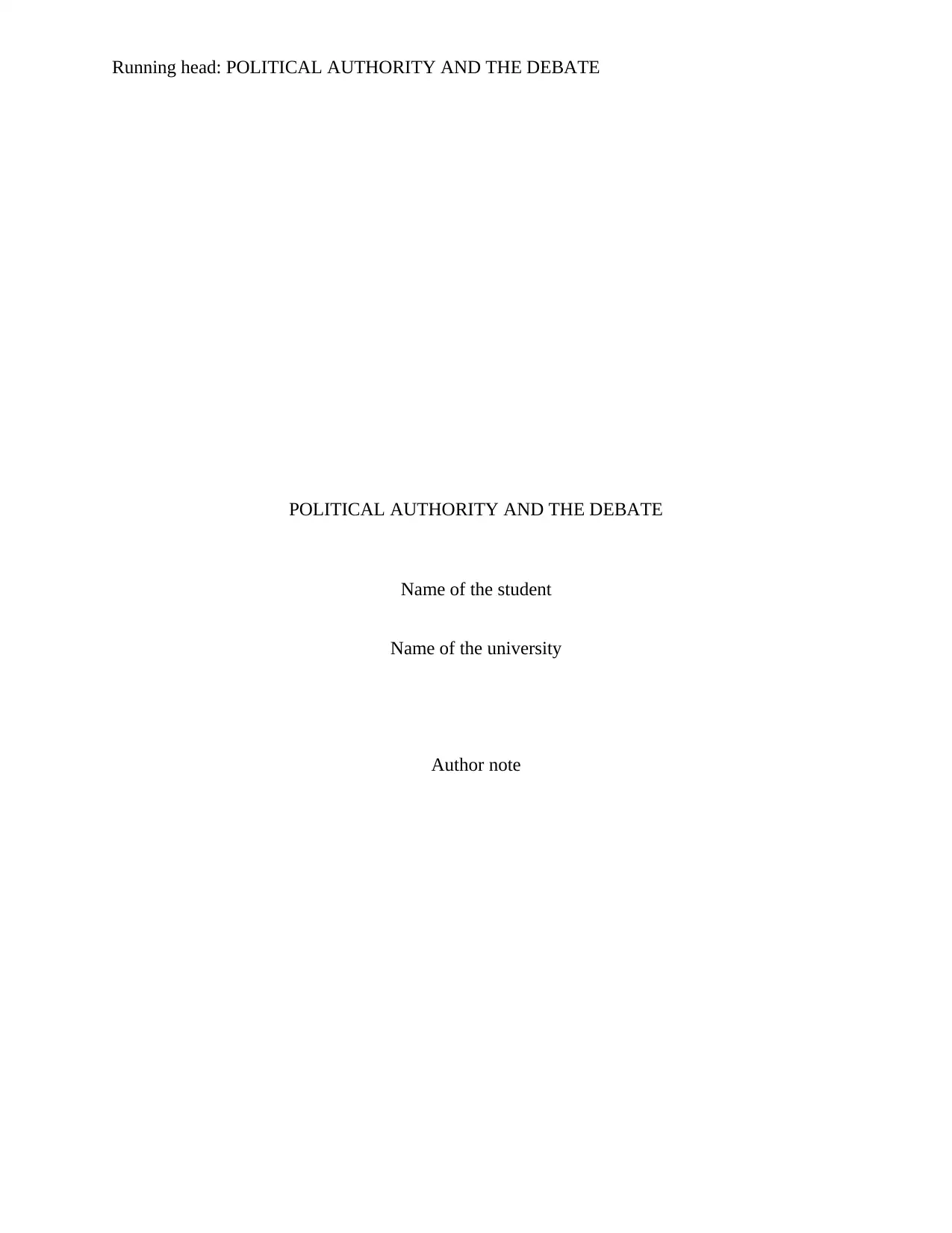
Running head: POLITICAL AUTHORITY AND THE DEBATE
POLITICAL AUTHORITY AND THE DEBATE
Name of the student
Name of the university
Author note
POLITICAL AUTHORITY AND THE DEBATE
Name of the student
Name of the university
Author note
Paraphrase This Document
Need a fresh take? Get an instant paraphrase of this document with our AI Paraphraser
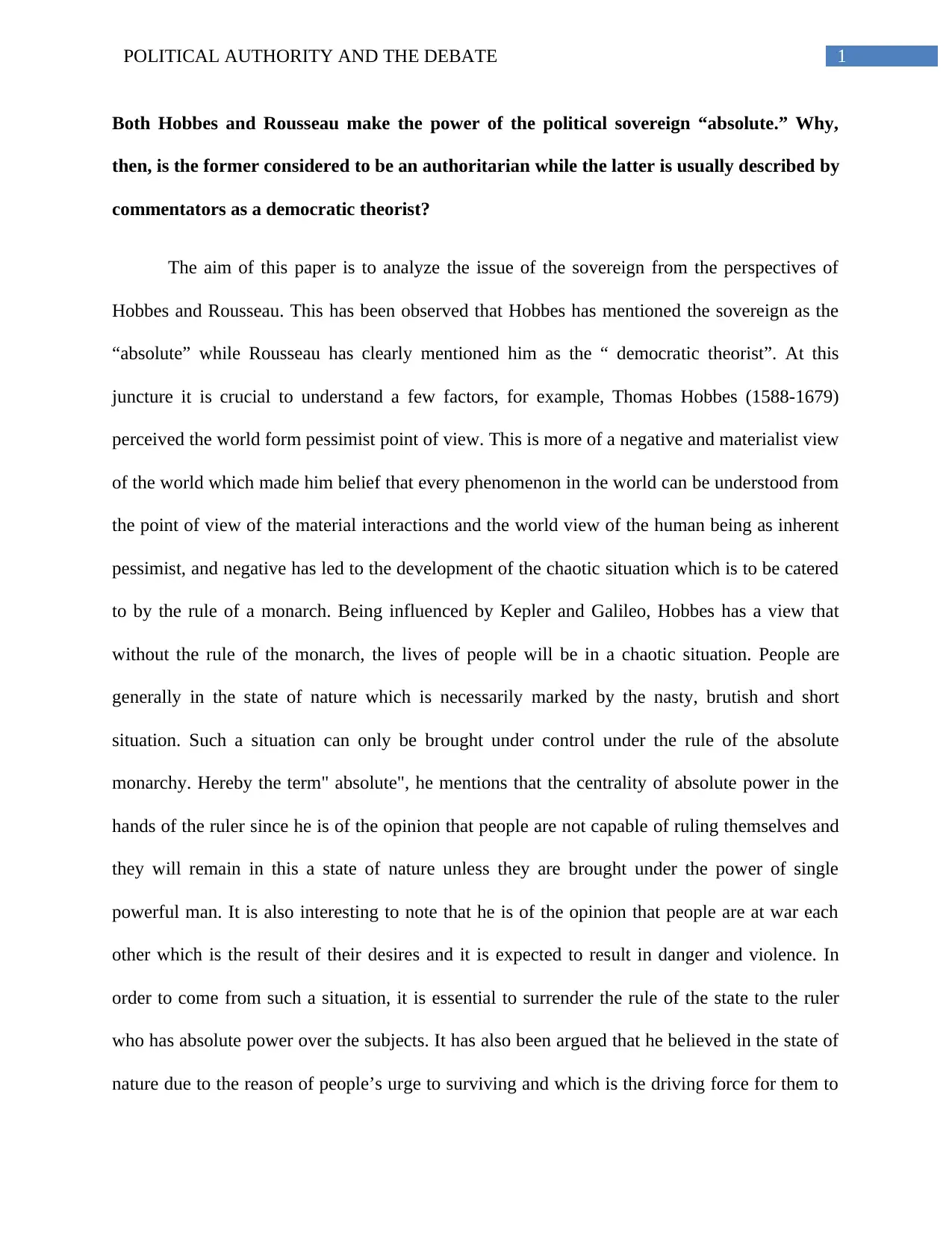
1POLITICAL AUTHORITY AND THE DEBATE
Both Hobbes and Rousseau make the power of the political sovereign “absolute.” Why,
then, is the former considered to be an authoritarian while the latter is usually described by
commentators as a democratic theorist?
The aim of this paper is to analyze the issue of the sovereign from the perspectives of
Hobbes and Rousseau. This has been observed that Hobbes has mentioned the sovereign as the
“absolute” while Rousseau has clearly mentioned him as the “ democratic theorist”. At this
juncture it is crucial to understand a few factors, for example, Thomas Hobbes (1588-1679)
perceived the world form pessimist point of view. This is more of a negative and materialist view
of the world which made him belief that every phenomenon in the world can be understood from
the point of view of the material interactions and the world view of the human being as inherent
pessimist, and negative has led to the development of the chaotic situation which is to be catered
to by the rule of a monarch. Being influenced by Kepler and Galileo, Hobbes has a view that
without the rule of the monarch, the lives of people will be in a chaotic situation. People are
generally in the state of nature which is necessarily marked by the nasty, brutish and short
situation. Such a situation can only be brought under control under the rule of the absolute
monarchy. Hereby the term" absolute", he mentions that the centrality of absolute power in the
hands of the ruler since he is of the opinion that people are not capable of ruling themselves and
they will remain in this a state of nature unless they are brought under the power of single
powerful man. It is also interesting to note that he is of the opinion that people are at war each
other which is the result of their desires and it is expected to result in danger and violence. In
order to come from such a situation, it is essential to surrender the rule of the state to the ruler
who has absolute power over the subjects. It has also been argued that he believed in the state of
nature due to the reason of people’s urge to surviving and which is the driving force for them to
Both Hobbes and Rousseau make the power of the political sovereign “absolute.” Why,
then, is the former considered to be an authoritarian while the latter is usually described by
commentators as a democratic theorist?
The aim of this paper is to analyze the issue of the sovereign from the perspectives of
Hobbes and Rousseau. This has been observed that Hobbes has mentioned the sovereign as the
“absolute” while Rousseau has clearly mentioned him as the “ democratic theorist”. At this
juncture it is crucial to understand a few factors, for example, Thomas Hobbes (1588-1679)
perceived the world form pessimist point of view. This is more of a negative and materialist view
of the world which made him belief that every phenomenon in the world can be understood from
the point of view of the material interactions and the world view of the human being as inherent
pessimist, and negative has led to the development of the chaotic situation which is to be catered
to by the rule of a monarch. Being influenced by Kepler and Galileo, Hobbes has a view that
without the rule of the monarch, the lives of people will be in a chaotic situation. People are
generally in the state of nature which is necessarily marked by the nasty, brutish and short
situation. Such a situation can only be brought under control under the rule of the absolute
monarchy. Hereby the term" absolute", he mentions that the centrality of absolute power in the
hands of the ruler since he is of the opinion that people are not capable of ruling themselves and
they will remain in this a state of nature unless they are brought under the power of single
powerful man. It is also interesting to note that he is of the opinion that people are at war each
other which is the result of their desires and it is expected to result in danger and violence. In
order to come from such a situation, it is essential to surrender the rule of the state to the ruler
who has absolute power over the subjects. It has also been argued that he believed in the state of
nature due to the reason of people’s urge to surviving and which is the driving force for them to
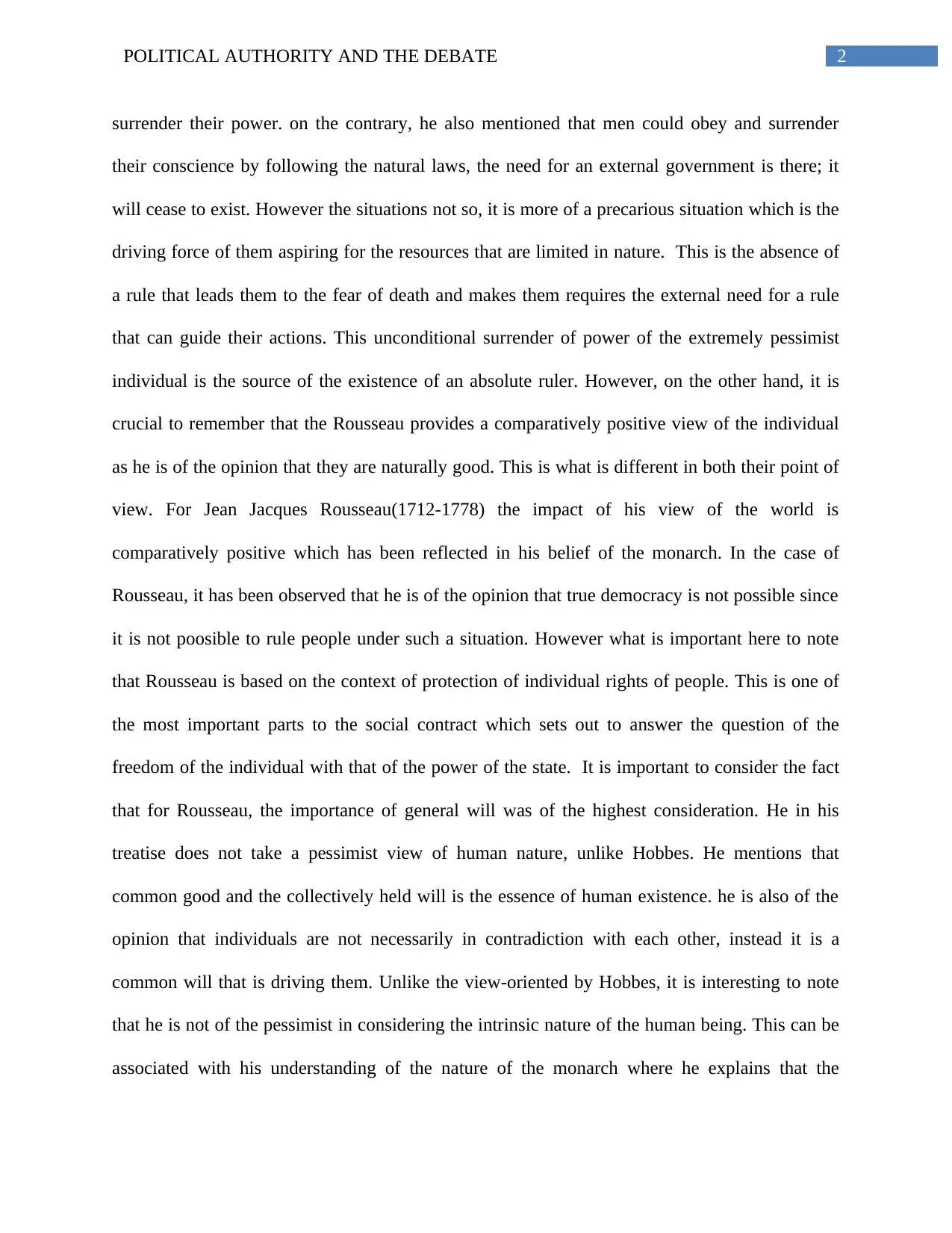
2POLITICAL AUTHORITY AND THE DEBATE
surrender their power. on the contrary, he also mentioned that men could obey and surrender
their conscience by following the natural laws, the need for an external government is there; it
will cease to exist. However the situations not so, it is more of a precarious situation which is the
driving force of them aspiring for the resources that are limited in nature. This is the absence of
a rule that leads them to the fear of death and makes them requires the external need for a rule
that can guide their actions. This unconditional surrender of power of the extremely pessimist
individual is the source of the existence of an absolute ruler. However, on the other hand, it is
crucial to remember that the Rousseau provides a comparatively positive view of the individual
as he is of the opinion that they are naturally good. This is what is different in both their point of
view. For Jean Jacques Rousseau(1712-1778) the impact of his view of the world is
comparatively positive which has been reflected in his belief of the monarch. In the case of
Rousseau, it has been observed that he is of the opinion that true democracy is not possible since
it is not poosible to rule people under such a situation. However what is important here to note
that Rousseau is based on the context of protection of individual rights of people. This is one of
the most important parts to the social contract which sets out to answer the question of the
freedom of the individual with that of the power of the state. It is important to consider the fact
that for Rousseau, the importance of general will was of the highest consideration. He in his
treatise does not take a pessimist view of human nature, unlike Hobbes. He mentions that
common good and the collectively held will is the essence of human existence. he is also of the
opinion that individuals are not necessarily in contradiction with each other, instead it is a
common will that is driving them. Unlike the view-oriented by Hobbes, it is interesting to note
that he is not of the pessimist in considering the intrinsic nature of the human being. This can be
associated with his understanding of the nature of the monarch where he explains that the
surrender their power. on the contrary, he also mentioned that men could obey and surrender
their conscience by following the natural laws, the need for an external government is there; it
will cease to exist. However the situations not so, it is more of a precarious situation which is the
driving force of them aspiring for the resources that are limited in nature. This is the absence of
a rule that leads them to the fear of death and makes them requires the external need for a rule
that can guide their actions. This unconditional surrender of power of the extremely pessimist
individual is the source of the existence of an absolute ruler. However, on the other hand, it is
crucial to remember that the Rousseau provides a comparatively positive view of the individual
as he is of the opinion that they are naturally good. This is what is different in both their point of
view. For Jean Jacques Rousseau(1712-1778) the impact of his view of the world is
comparatively positive which has been reflected in his belief of the monarch. In the case of
Rousseau, it has been observed that he is of the opinion that true democracy is not possible since
it is not poosible to rule people under such a situation. However what is important here to note
that Rousseau is based on the context of protection of individual rights of people. This is one of
the most important parts to the social contract which sets out to answer the question of the
freedom of the individual with that of the power of the state. It is important to consider the fact
that for Rousseau, the importance of general will was of the highest consideration. He in his
treatise does not take a pessimist view of human nature, unlike Hobbes. He mentions that
common good and the collectively held will is the essence of human existence. he is also of the
opinion that individuals are not necessarily in contradiction with each other, instead it is a
common will that is driving them. Unlike the view-oriented by Hobbes, it is interesting to note
that he is not of the pessimist in considering the intrinsic nature of the human being. This can be
associated with his understanding of the nature of the monarch where he explains that the
⊘ This is a preview!⊘
Do you want full access?
Subscribe today to unlock all pages.

Trusted by 1+ million students worldwide
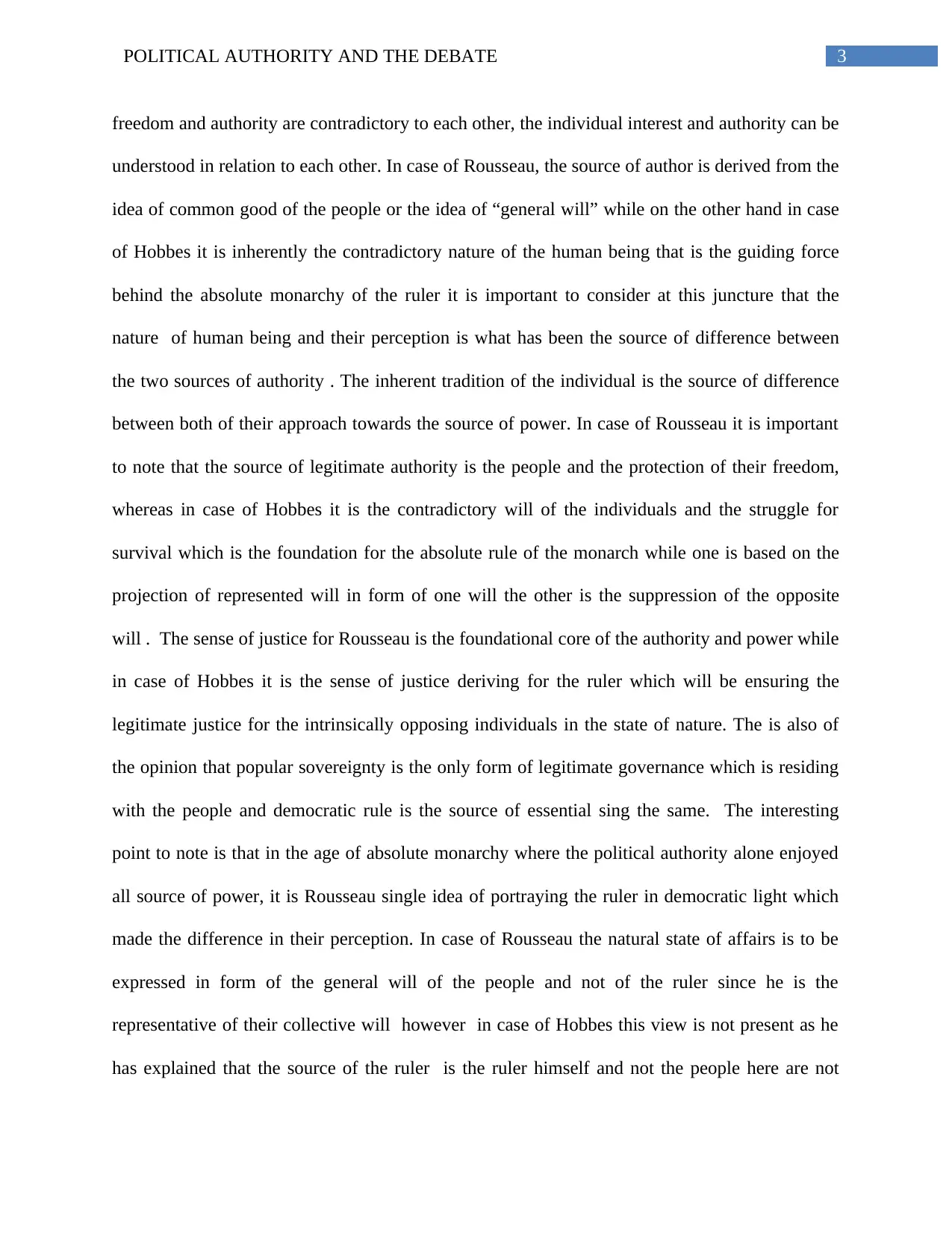
3POLITICAL AUTHORITY AND THE DEBATE
freedom and authority are contradictory to each other, the individual interest and authority can be
understood in relation to each other. In case of Rousseau, the source of author is derived from the
idea of common good of the people or the idea of “general will” while on the other hand in case
of Hobbes it is inherently the contradictory nature of the human being that is the guiding force
behind the absolute monarchy of the ruler it is important to consider at this juncture that the
nature of human being and their perception is what has been the source of difference between
the two sources of authority . The inherent tradition of the individual is the source of difference
between both of their approach towards the source of power. In case of Rousseau it is important
to note that the source of legitimate authority is the people and the protection of their freedom,
whereas in case of Hobbes it is the contradictory will of the individuals and the struggle for
survival which is the foundation for the absolute rule of the monarch while one is based on the
projection of represented will in form of one will the other is the suppression of the opposite
will . The sense of justice for Rousseau is the foundational core of the authority and power while
in case of Hobbes it is the sense of justice deriving for the ruler which will be ensuring the
legitimate justice for the intrinsically opposing individuals in the state of nature. The is also of
the opinion that popular sovereignty is the only form of legitimate governance which is residing
with the people and democratic rule is the source of essential sing the same. The interesting
point to note is that in the age of absolute monarchy where the political authority alone enjoyed
all source of power, it is Rousseau single idea of portraying the ruler in democratic light which
made the difference in their perception. In case of Rousseau the natural state of affairs is to be
expressed in form of the general will of the people and not of the ruler since he is the
representative of their collective will however in case of Hobbes this view is not present as he
has explained that the source of the ruler is the ruler himself and not the people here are not
freedom and authority are contradictory to each other, the individual interest and authority can be
understood in relation to each other. In case of Rousseau, the source of author is derived from the
idea of common good of the people or the idea of “general will” while on the other hand in case
of Hobbes it is inherently the contradictory nature of the human being that is the guiding force
behind the absolute monarchy of the ruler it is important to consider at this juncture that the
nature of human being and their perception is what has been the source of difference between
the two sources of authority . The inherent tradition of the individual is the source of difference
between both of their approach towards the source of power. In case of Rousseau it is important
to note that the source of legitimate authority is the people and the protection of their freedom,
whereas in case of Hobbes it is the contradictory will of the individuals and the struggle for
survival which is the foundation for the absolute rule of the monarch while one is based on the
projection of represented will in form of one will the other is the suppression of the opposite
will . The sense of justice for Rousseau is the foundational core of the authority and power while
in case of Hobbes it is the sense of justice deriving for the ruler which will be ensuring the
legitimate justice for the intrinsically opposing individuals in the state of nature. The is also of
the opinion that popular sovereignty is the only form of legitimate governance which is residing
with the people and democratic rule is the source of essential sing the same. The interesting
point to note is that in the age of absolute monarchy where the political authority alone enjoyed
all source of power, it is Rousseau single idea of portraying the ruler in democratic light which
made the difference in their perception. In case of Rousseau the natural state of affairs is to be
expressed in form of the general will of the people and not of the ruler since he is the
representative of their collective will however in case of Hobbes this view is not present as he
has explained that the source of the ruler is the ruler himself and not the people here are not
Paraphrase This Document
Need a fresh take? Get an instant paraphrase of this document with our AI Paraphraser
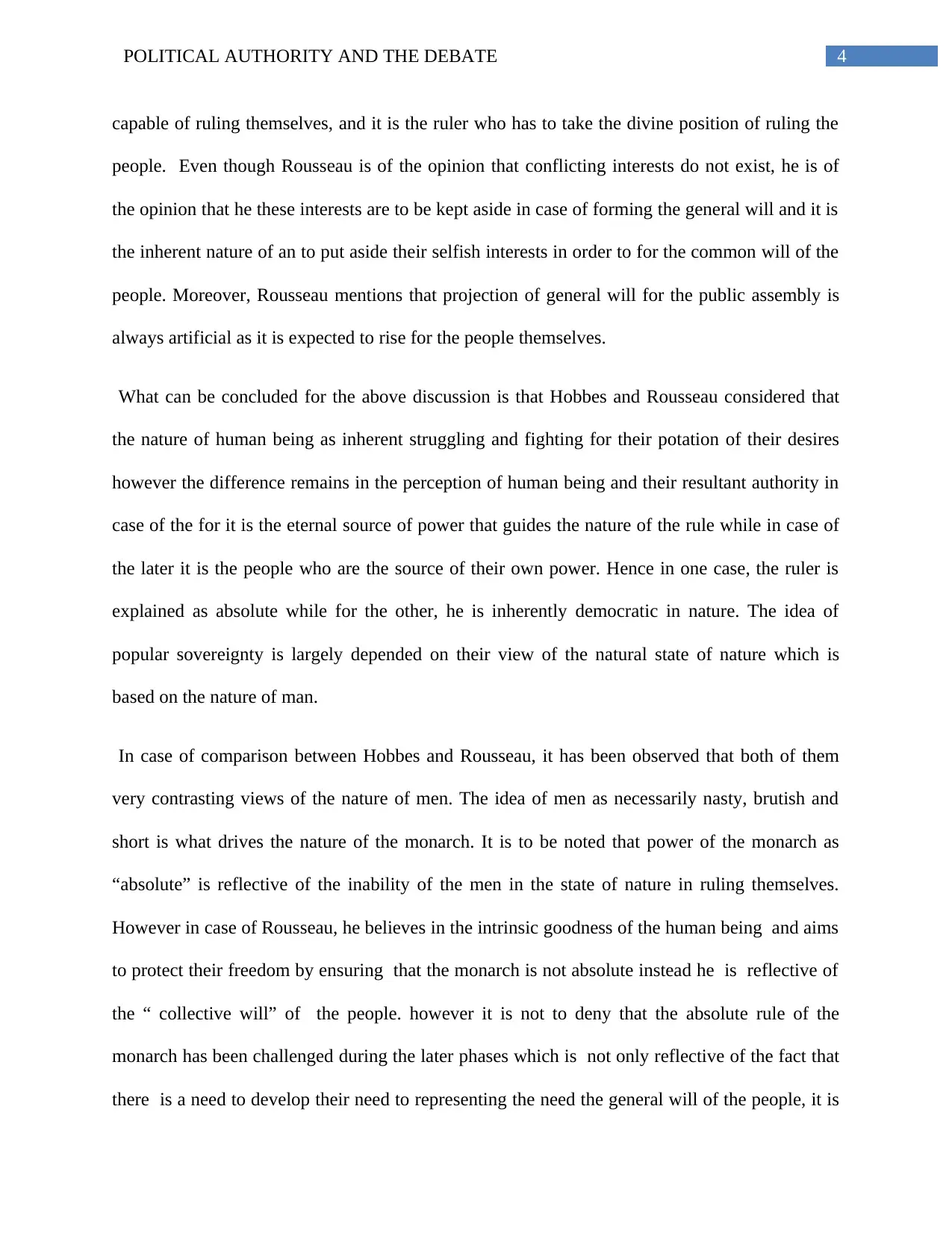
4POLITICAL AUTHORITY AND THE DEBATE
capable of ruling themselves, and it is the ruler who has to take the divine position of ruling the
people. Even though Rousseau is of the opinion that conflicting interests do not exist, he is of
the opinion that he these interests are to be kept aside in case of forming the general will and it is
the inherent nature of an to put aside their selfish interests in order to for the common will of the
people. Moreover, Rousseau mentions that projection of general will for the public assembly is
always artificial as it is expected to rise for the people themselves.
What can be concluded for the above discussion is that Hobbes and Rousseau considered that
the nature of human being as inherent struggling and fighting for their potation of their desires
however the difference remains in the perception of human being and their resultant authority in
case of the for it is the eternal source of power that guides the nature of the rule while in case of
the later it is the people who are the source of their own power. Hence in one case, the ruler is
explained as absolute while for the other, he is inherently democratic in nature. The idea of
popular sovereignty is largely depended on their view of the natural state of nature which is
based on the nature of man.
In case of comparison between Hobbes and Rousseau, it has been observed that both of them
very contrasting views of the nature of men. The idea of men as necessarily nasty, brutish and
short is what drives the nature of the monarch. It is to be noted that power of the monarch as
“absolute” is reflective of the inability of the men in the state of nature in ruling themselves.
However in case of Rousseau, he believes in the intrinsic goodness of the human being and aims
to protect their freedom by ensuring that the monarch is not absolute instead he is reflective of
the “ collective will” of the people. however it is not to deny that the absolute rule of the
monarch has been challenged during the later phases which is not only reflective of the fact that
there is a need to develop their need to representing the need the general will of the people, it is
capable of ruling themselves, and it is the ruler who has to take the divine position of ruling the
people. Even though Rousseau is of the opinion that conflicting interests do not exist, he is of
the opinion that he these interests are to be kept aside in case of forming the general will and it is
the inherent nature of an to put aside their selfish interests in order to for the common will of the
people. Moreover, Rousseau mentions that projection of general will for the public assembly is
always artificial as it is expected to rise for the people themselves.
What can be concluded for the above discussion is that Hobbes and Rousseau considered that
the nature of human being as inherent struggling and fighting for their potation of their desires
however the difference remains in the perception of human being and their resultant authority in
case of the for it is the eternal source of power that guides the nature of the rule while in case of
the later it is the people who are the source of their own power. Hence in one case, the ruler is
explained as absolute while for the other, he is inherently democratic in nature. The idea of
popular sovereignty is largely depended on their view of the natural state of nature which is
based on the nature of man.
In case of comparison between Hobbes and Rousseau, it has been observed that both of them
very contrasting views of the nature of men. The idea of men as necessarily nasty, brutish and
short is what drives the nature of the monarch. It is to be noted that power of the monarch as
“absolute” is reflective of the inability of the men in the state of nature in ruling themselves.
However in case of Rousseau, he believes in the intrinsic goodness of the human being and aims
to protect their freedom by ensuring that the monarch is not absolute instead he is reflective of
the “ collective will” of the people. however it is not to deny that the absolute rule of the
monarch has been challenged during the later phases which is not only reflective of the fact that
there is a need to develop their need to representing the need the general will of the people, it is
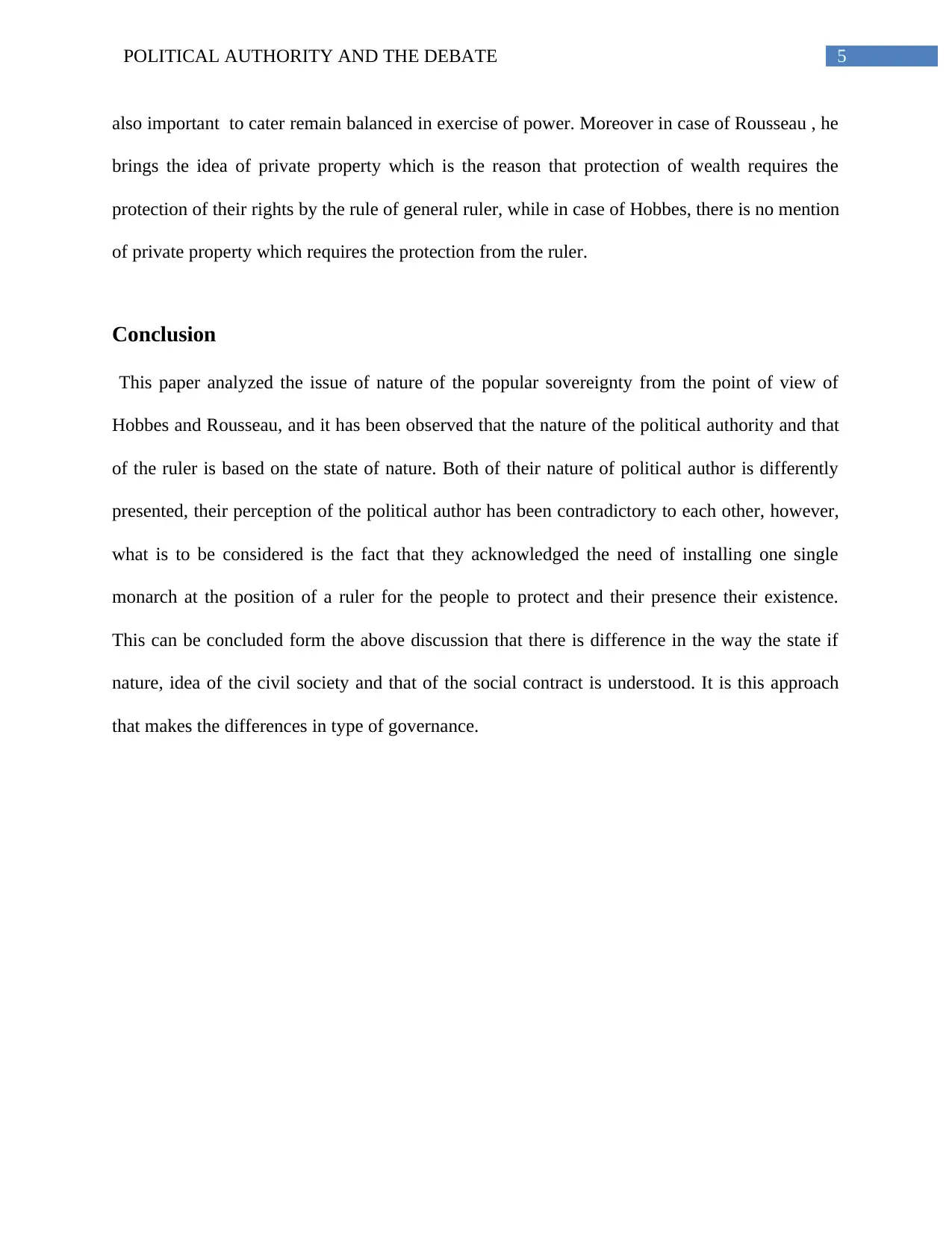
5POLITICAL AUTHORITY AND THE DEBATE
also important to cater remain balanced in exercise of power. Moreover in case of Rousseau , he
brings the idea of private property which is the reason that protection of wealth requires the
protection of their rights by the rule of general ruler, while in case of Hobbes, there is no mention
of private property which requires the protection from the ruler.
Conclusion
This paper analyzed the issue of nature of the popular sovereignty from the point of view of
Hobbes and Rousseau, and it has been observed that the nature of the political authority and that
of the ruler is based on the state of nature. Both of their nature of political author is differently
presented, their perception of the political author has been contradictory to each other, however,
what is to be considered is the fact that they acknowledged the need of installing one single
monarch at the position of a ruler for the people to protect and their presence their existence.
This can be concluded form the above discussion that there is difference in the way the state if
nature, idea of the civil society and that of the social contract is understood. It is this approach
that makes the differences in type of governance.
also important to cater remain balanced in exercise of power. Moreover in case of Rousseau , he
brings the idea of private property which is the reason that protection of wealth requires the
protection of their rights by the rule of general ruler, while in case of Hobbes, there is no mention
of private property which requires the protection from the ruler.
Conclusion
This paper analyzed the issue of nature of the popular sovereignty from the point of view of
Hobbes and Rousseau, and it has been observed that the nature of the political authority and that
of the ruler is based on the state of nature. Both of their nature of political author is differently
presented, their perception of the political author has been contradictory to each other, however,
what is to be considered is the fact that they acknowledged the need of installing one single
monarch at the position of a ruler for the people to protect and their presence their existence.
This can be concluded form the above discussion that there is difference in the way the state if
nature, idea of the civil society and that of the social contract is understood. It is this approach
that makes the differences in type of governance.
⊘ This is a preview!⊘
Do you want full access?
Subscribe today to unlock all pages.

Trusted by 1+ million students worldwide
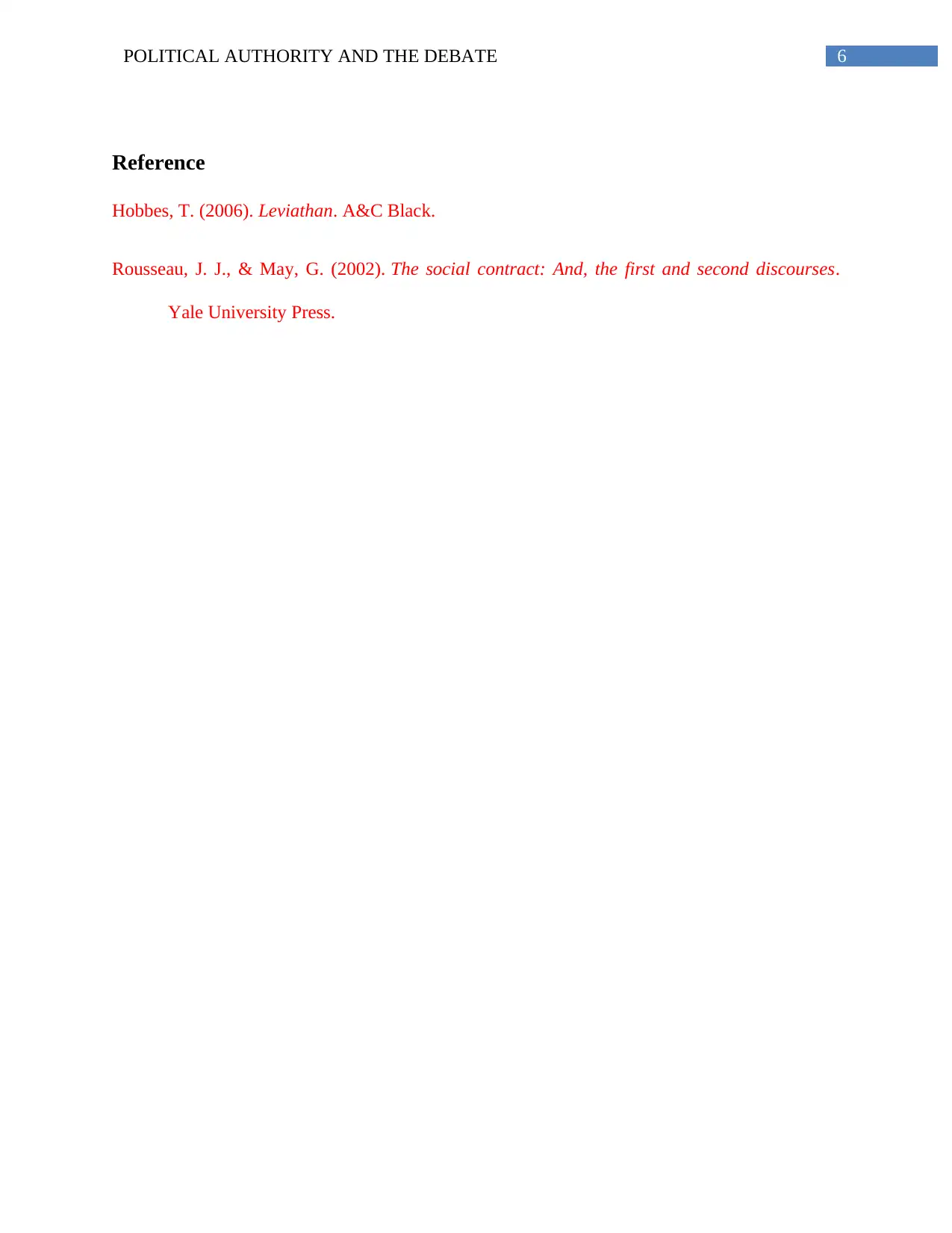
6POLITICAL AUTHORITY AND THE DEBATE
Reference
Hobbes, T. (2006). Leviathan. A&C Black.
Rousseau, J. J., & May, G. (2002). The social contract: And, the first and second discourses.
Yale University Press.
Reference
Hobbes, T. (2006). Leviathan. A&C Black.
Rousseau, J. J., & May, G. (2002). The social contract: And, the first and second discourses.
Yale University Press.
1 out of 7
Related Documents
Your All-in-One AI-Powered Toolkit for Academic Success.
+13062052269
info@desklib.com
Available 24*7 on WhatsApp / Email
![[object Object]](/_next/static/media/star-bottom.7253800d.svg)
Unlock your academic potential
Copyright © 2020–2026 A2Z Services. All Rights Reserved. Developed and managed by ZUCOL.





